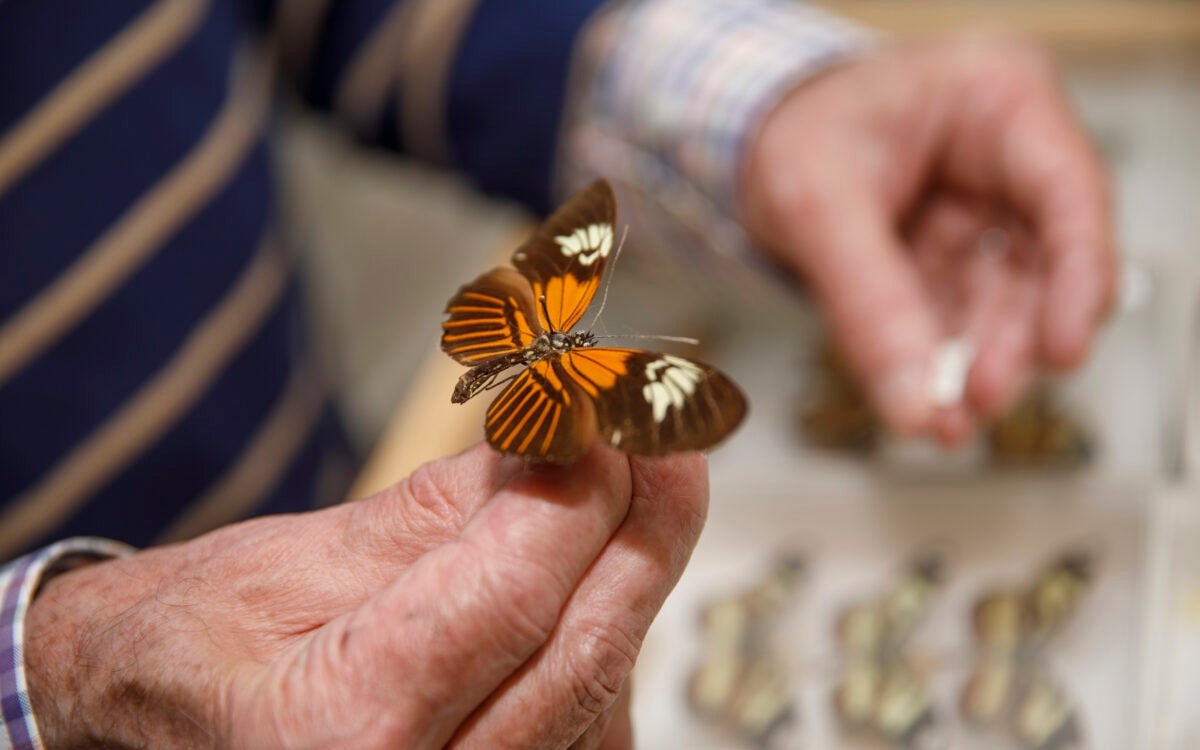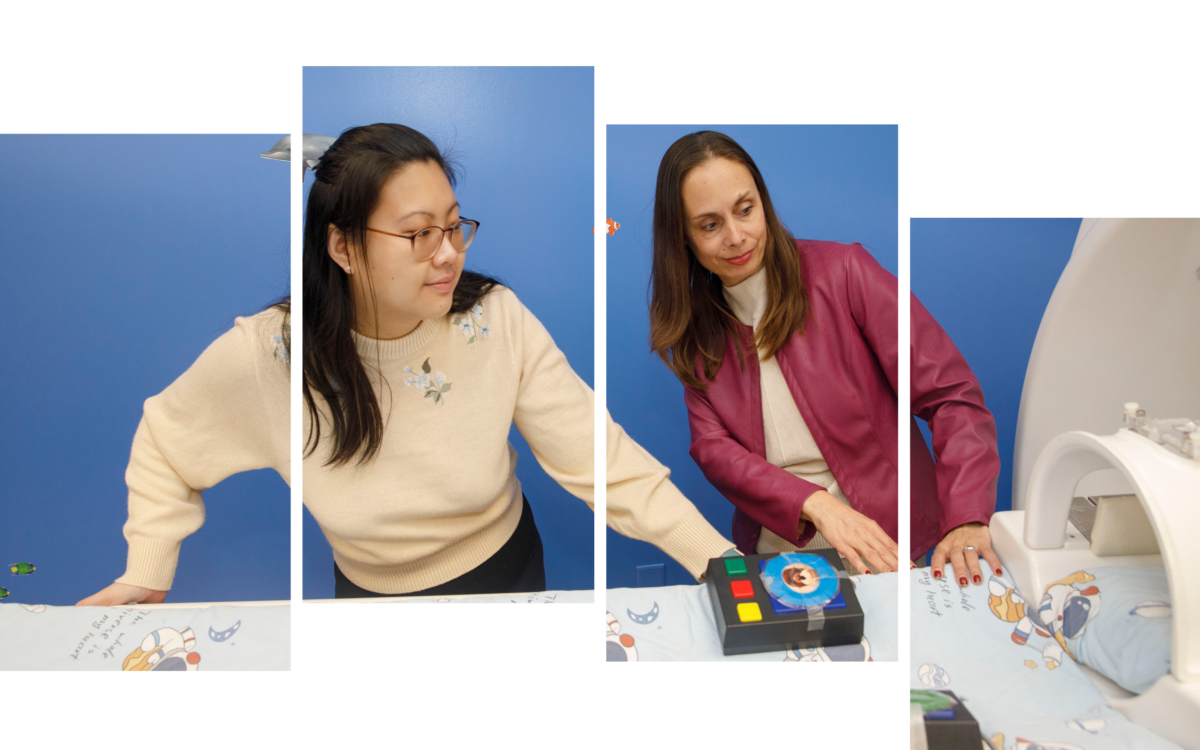From neuroscience to childhood policy
Shonkoff demonstrates how research leads to lawmaking
The Center on the Developing Child, founded in July 2006 to promote healthy child development as “the foundation of community development, economic prosperity, and a secure nation,” has been putting its message forth in a powerful series of colloquia across the University.
Wednesday night (Dec. 5) director Jack P. Shonkoff brought his case to a packed Starr Auditorium in the Belfer Center of Harvard’s John F. Kennedy School of Government, explaining how new findings in early childhood neurobiology can be brought to bear on policymakers to put programs into place that could eventually lower rates of heart attack and diabetes, incarceration, mental illness, public assistance, and other social ills nationwide.
“The healthy development of children is really the foundation for economic productivity, responsible citizenship, and lifelong physical and mental health,” said Shonkoff, the Julius B. Richmond FAMRI Professor of Child Health and Development at the Harvard School of Public Health. “Science can add new insights into how health, learning, and competencies develop over time, beyond just the social and political contextual factors.”
The recent flood of information on genetics and genomics, he added, has put to rest the question of nature versus nurture: both are at play, but environment is an extremely powerful influence during the critical early years, when a child’s neural circuitry is developing. “The interaction of genes and experience shapes the architecture of the developing brain,” Shonkoff said. “Genes may fix your eye color, but not your intelligence, competence, and social well-being.” The most important factor for developing healthy circuits in a growing baby’s brain is the “serve and return” nature of the infant’s interaction with the caring adults around him, through which he acquires the language skills on which all subsequent learning is based.
To illustrate his point, Shonkoff showed some statistical charts indicating that by age 3, children of high socioeconomic status (SES) have almost three times the vocabulary of those living below the poverty level; “in fact,” he added, “one study showed the highest SES kids demonstrated higher vocabularies than the mothers in the lowest group during observational sessions.”
Though that finding may seem shocking to some, to Shonkoff and his colleagues in neurobiology, molecular biology, genetics, and other sciences, it only makes sense.
“Brains are built over time,” Shonkoff pointed out. “Neural circuits are wired in a bottom-up sequence, and the capacity for change decreases with age. The brain is very adaptable, but it’s hard to make up the difference if it’s building on a weak foundation.”
The most profound interruptions to building strong neural pathways come from stress. Unfortunately, Shonkoff said, “going into the policy arena and saying there are children living under stress is a losing battle” — partly because everyone has stress in their lives, and partly because adverse events are considered character-building in U.S. culture. But it is the type of stress that young children live with and how it is handled that can make all the difference.
There are three kinds of stress, Shonkoff explained. Positive stress is indeed the character-building kind; it comes when a child spends her first day in a preschool program, or is told she can’t have another cookie. “Children learn to adapt and deal with that in the context of positive relationships with caring adults,” he said. The changes in children’s stress-hormone levels caused by such minor glitches quickly return to baseline after reassurance from a caregiver, allowing the brain to get back to its circuit-building activities.
The second kind of stress, called “tolerable,” said Shonkoff, “could potentially disrupt the brain architecture but doesn’t if the child is buffered by supportive relationships.” That loving support makes some children who suffer significant adversity — the death of a parent, an event like Hurricane Katrina, or living amid war or violence — more resilient than others. “The body is not meant to be stressed all the time,” Shonkoff said, and when stress-hormone levels rise and stay high, “it damages brain cells, depresses the immune system, and breaks the circuits” in many parts of the brain — particularly the hippocampus, or learning center.
The most damaging kind of stress is toxic stress, which occurs in the absence of adult support. “No predictable adult protection damages the brain and affects the person’s threshold for stress throughout life.” Children whose early lives include extreme poverty, a parent’s prolonged substance abuse, emotional or physical violence in the home, abuse or neglect, or other risk factors experience “disruptions to the developing nervous and immune systems that lead to later problems in learning, behavior, and health. These things are preventable,” Shonkoff concluded.
That comment dovetailed into the second part of the evening: talks by state legislators Ruth Kagi, Democrat of Washington state, and Wes Hayes, Republican of South Carolina. Both discussed the huge differences the advocacy of Shonkoff and other scientists had made in getting early-childhood bills passed through their state legislatures. Kagi began by pointing out that though she had introduced bills annually during her nine-year tenure in the statehouse, it was only in the past two years that they started being noticed and indeed approved — all, she said, “through the magic of science.”
In fact, after hearing the scientists’ presentations, she added, the “most conservative ranking Republican, who had stopped every piece of early childhood legislation in the past five years, came up to me and said, ‘I get it.’” The result was overwhelming bipartisan support for the issue and a total of $136 million in private-public funding for Washington state’s new Department of Early Learning and a quality-based program called Thrive by Five.
Hayes indicated a similar triumph was afoot in his home state, which he called one of the most impoverished in the nation. After Shonkoff spoke to the legislature, Hayes said, the state passed a two-year pilot program for kindergarten classes for 4-year-olds, which Hayes hopes will be approved to go statewide next year, despite the probable tough economic times ahead. “The people in this room take for granted that everyone knows the things that Jack talked about here,” he said, “but talk of early childhood is just glorified babysitting to a lot of legislators. The research is saying that if you wait till K through 12, you’re too late. The child will always be playing catch-up and will eventually drop out.” When you’re talking to politicians, added the lifelong politician, “I’m here to tell you that science does make a difference.”




